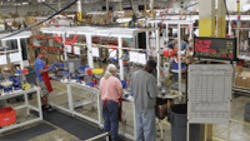Safety is a point of pride at Snap-on Power Tools' Murphy, N.C., facility, a 2010 IndustryWeek Best Plants winner. But RCI manager Todd Rowe acknowledges that the plant's safety performance took a hit in 2008, when the facility was producing power tools at a record volume.
"We were still below the [OSHA] industry average," Rowe points out. "But we took a step back at that time and tried to figure out what was going on."
The plant concluded that the spike in its OSHA recordable-incident rate was largely due to the fact that "we were putting a lot of people in new areas," including temporary workers brought on to accommodate the increased production, "and we were producing at a lot faster rate than we had before," Rowe explains.
The solution was a mentoring program. Now, any time an associate -- whether it's a new hire or a seasoned veteran -- starts working in a process that's new to him or her, the associate must shadow an experienced mentor for one month to learn proper procedures and practices.
In the Murphy facility, which needs its associates to be able to work in multiple areas so the plant can shift production based on demand, the mentoring program has had a huge impact on safety. The plant's OSHA recordable-incident rate dropped from a peak of over 6.0 in July 2008 to 0.0 in July 2010, and its OSHA recordable-incident rate for injuries and illnesses with days away from work was 0.0 in 2009. Plant manager Brian Spikes attributes that improvement to the implementation of the mentoring program.
The mentoring process also benefits the mentor, Spikes adds.
"You get more information back to the guy doing the training," Spikes says. "Because when he's doing the training, the other guy is asking a lot of questions, and it makes [the mentor] think about why he's doing things the way he's doing them. It helps both of them get a refresher course."
See Also:
• Out of Sight
About the Author
Josh Cable
Former Senior Editor
Former Senior Editor Josh Cable covered innovation issues -- including trends and best practices in R&D, process improvement and product development. He also reported on the best practices of the most successful companies and executives in the world of transportation manufacturing, which encompasses the aerospace, automotive, rail and shipbuilding sectors.
Josh also led the IndustryWeek Manufacturing Hall of Fame, IW’s annual tribute to the most influential executives and thought leaders in U.S. manufacturing history.
Before joining IndustryWeek, Josh was the editor-in-chief of Penton Media’s Government Product News and Government Procurement. He also was an award-winning beat reporter for several small newspapers in Northeast Ohio.
Josh received his BFA in creative writing from Bowling Green University, and continued his professional development through course-work at Ohio University and Cuyahoga Community College.
A lifelong resident of the Buckeye State, Josh currently lives in the Tremont neighborhood of Cleveland. When the weather cooperates, you’ll find him riding his bike to work, exercising his green thumb in the backyard or playing ultimate Frisbee.
